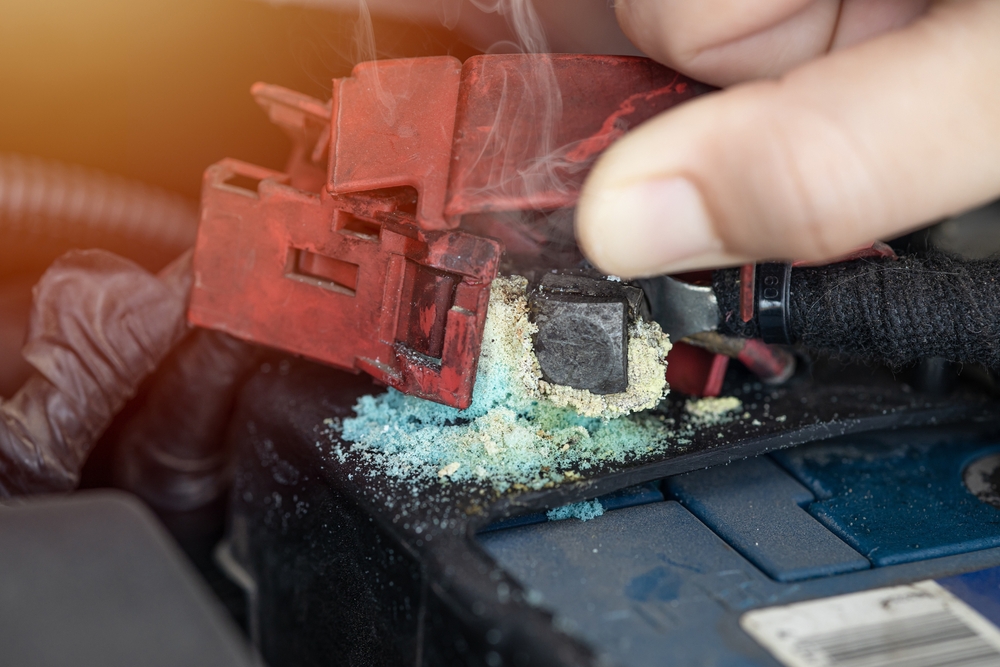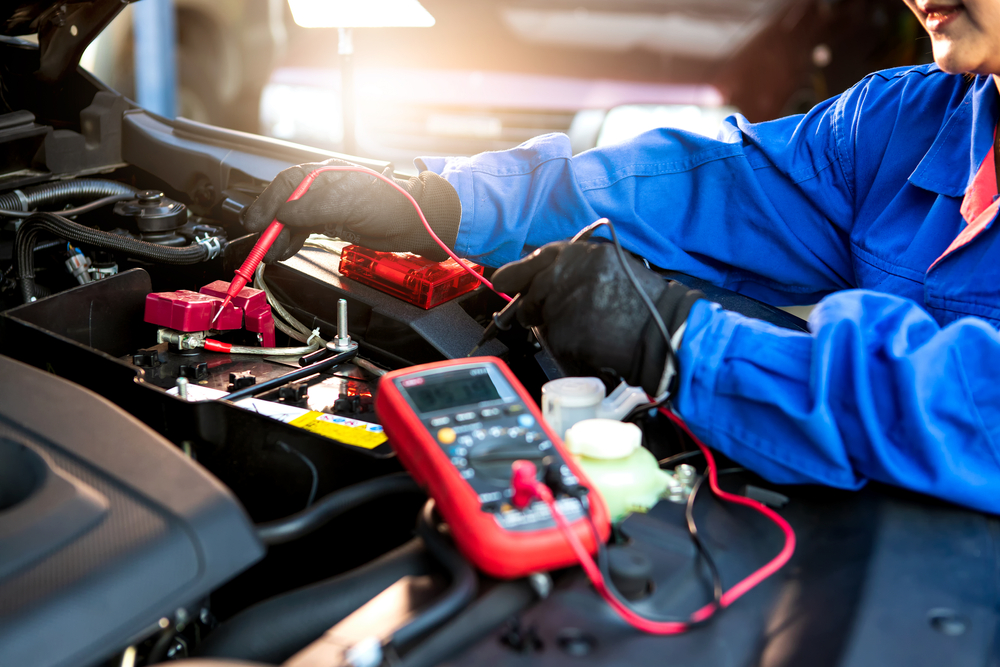Summer in Middle Tennessee brings more than just longer days and trips to Stones River—it delivers relentless heat that can silently destroy your Ford’s battery. While most drivers think winter kills batteries, the truth is remarkably different. Tennessee’s sweltering summer temperatures, regularly reaching the upper 80s and low 90s, create the perfect storm for battery failure. The scorching pavement on Old Fort Parkway and the heat radiating from I-24 asphalt make your engine bay even hotter, accelerating battery damage in ways that won’t show up until you’re stuck in a Kroger parking lot. At Ford of Murfreesboro Service, we’ve seen countless drivers stranded because they didn’t realize their battery was slowly dying all summer long.
The reality is that summer heat does far more damage to your Ford’s battery than Middle Tennessee’s mild winters ever could. When temperatures soar into the 90s, your battery’s internal fluids evaporate faster, chemical reactions accelerate dangerously, and corrosion builds up rapidly on terminals. This means your trusty F-150 that started perfectly through winter could suddenly fail you during the hottest week of July. Understanding how heat affects your battery—and taking proactive steps now—can save you from being stranded during peak summer driving season when you need your vehicle most for work, family activities, and weekend adventures around Rutherford County.
Don’t Let the Tennessee Sun Leave You Stranded
Picture this scenario: you’re leaving work on a scorching July afternoon, ready to pick up the kids from camp at Cannonsburgh Village, and your Ford won’t start. The dashboard lights flicker weakly, the engine barely turns over, and you’re stuck in the blazing heat. This nightmare happens to thousands of Middle Tennessee drivers every summer, and it’s completely preventable. The combination of Tennessee’s intense summer sun and your engine’s natural heat creates temperatures under the hood that can exceed 140°F—hot enough to literally cook your battery from the inside out.
What makes this situation even more frustrating is that battery failure rarely happens gradually. Your Ford might start perfectly fine on Monday morning, struggle slightly on Tuesday, and completely fail by Wednesday afternoon. Unlike other car problems that give you plenty of warning, a heat-damaged battery can go from “working fine” to “completely dead” in just a few days. This sudden failure typically strikes during the most inconvenient moments—rushing to an important meeting downtown, heading to the Murfreesboro airport, or trying to get home during rush hour traffic on Highway 96. The good news is that with proper maintenance and regular testing, you can easily avoid this scenario and keep your Ford running reliably all summer long.
Why Summer Heat is Your Battery’s Worst Enemy
Tennessee summers present a unique challenge for car batteries that many drivers simply don’t understand. According to Consumer Reports testing, batteries in hot climates like Middle Tennessee have an average lifespan of just 40 months compared to 60 months in cooler regions. This dramatic difference occurs because heat accelerates every destructive process happening inside your battery. The chemical reactions that normally provide power become overactive, causing the electrolyte fluid to evaporate much faster than it should.
When your Ford sits in the baking sun on a Murfreesboro parking lot, the internal temperature of your battery can reach dangerous levels. The heat causes the lead plates inside to corrode more rapidly, while the plastic case can actually warp slightly, creating internal shorts. Even worse, the combination of high temperatures and electrical demand from your air conditioning system puts enormous stress on the battery’s charging system. This creates a vicious cycle where your alternator works harder, generates more heat, and further accelerates battery degradation. Understanding this process helps explain why proactive battery maintenance is so critical during our intense summer months.
Signs Your Ford’s Battery is Crying for Help
Your Ford’s battery will usually give you warning signs before it fails completely, but you need to know what to look for. The most obvious early indicator is slow engine cranking, especially noticeable during your first start of the day. If your engine takes longer than usual to turn over, or if you hear a sluggish “rur-rur-rur” instead of the normal quick startup, your battery is telling you it’s struggling. This symptom becomes more pronounced as temperatures rise throughout the day, since heat further reduces an already-weakened battery’s capacity.
Other critical warning signs include dimming headlights when you’re idling at traffic lights along Memorial Boulevard, dashboard warning lights that flicker intermittently, or electrical accessories that work inconsistently. You might notice your radio presets resetting, your clock losing time, or your remote key fob requiring multiple presses to work properly. These seemingly minor issues are actually serious red flags indicating your battery can’t maintain consistent voltage. If you experience any of these symptoms, especially during Middle Tennessee’s peak summer heat, it’s time to have your battery professionally tested before it leaves you stranded.
- Slow engine cranking: Takes longer than normal for your Ford’s engine to start, particularly on hot afternoons when the battery has been heat-soaked all day
- Dim or flickering lights: Headlights, dashboard lights, or interior lights that seem weaker than usual, especially when the air conditioning is running
- Electrical issues: Radio presets disappearing, clock resetting, or inconsistent performance from power windows and accessories
- Dashboard warning lights: Battery or charging system lights that appear intermittently, often during high electrical demand situations
- Swollen battery case: Physical signs of heat damage including a bloated or warped battery case, which indicates dangerous internal pressure buildup
- Corrosion buildup: White, blue, or green crusty deposits around battery terminals that accumulate faster in hot weather conditions
Proactive Steps to Protect Your Battery This Summer
The best defense against summer battery failure is taking proactive steps before the heat becomes unbearable. Start by parking in shaded areas whenever possible, whether that’s under the covered parking at The Avenue Murfreesboro or in your garage at home. Even a few degrees of temperature reduction can significantly extend your battery’s life during the brutal summer months. When shade isn’t available, consider using a windshield sunshade to reduce the overall heat buildup in your engine compartment.
Regular maintenance becomes absolutely critical during Tennessee summers. Keep your battery terminals clean and tight, since heat accelerates corrosion that can interrupt electrical flow. Check the electrolyte level if you have a serviceable battery, and ensure your engine’s cooling system is working properly to reduce overall under-hood temperatures. Most importantly, avoid short trips when possible during peak heat hours, since your battery needs time to fully recharge after starting. Multiple short trips during hot weather can gradually drain your battery without giving the alternator sufficient time to replenish the charge, creating a cumulative effect that leads to premature failure.
The Ford of Murfreesboro Service Advantage: Genuine Parts, Expert Technicians
When it comes to protecting your Ford’s battery from Tennessee’s punishing summer heat, choosing the right service center makes all the difference. At Ford of Murfreesboro Service, our factory-trained technicians understand exactly how Middle Tennessee’s climate affects your specific Ford model. Unlike generic auto shops, we have access to Ford’s latest service bulletins, technical training, and diagnostic equipment specifically designed for your vehicle. This expertise allows us to identify potential battery issues before they become expensive failures, saving you both hassle and money.
Our commitment to using genuine Ford parts ensures your new battery is engineered specifically for your vehicle’s electrical demands and our regional climate conditions. Genuine Ford batteries come with superior heat tolerance, longer warranties, and exact specifications that match your Ford’s charging system. We also provide comprehensive testing using Ford-approved diagnostic equipment that can detect subtle battery weaknesses that generic testers might miss. When you choose Ford of Murfreesboro Service, you’re getting more than just a battery replacement—you’re getting peace of mind that your Ford will start reliably every time, even during the hottest Tennessee summer days.
Ready for Any Adventure: Ensuring Your New Ford is Summer-Ready
If you’ve recently purchased a new Ford from our dealership, congratulations on making an excellent choice for Middle Tennessee driving conditions. However, even new vehicles need proper battery care during our intense summer months. New Ford models come equipped with advanced electrical systems that support features like remote start, advanced infotainment, and multiple USB charging ports. While these conveniences enhance your driving experience, they also place greater demands on your battery, making proper maintenance even more important.
Your new Ford’s battery was designed to handle these electrical demands, but Tennessee’s extreme summer heat can still accelerate wear if you’re not careful. Take advantage of our complimentary battery check service to establish a baseline for your new vehicle’s electrical system. This early assessment helps us track your battery’s condition over time and predict when replacement might be necessary. Additionally, we can provide specific advice for your model about optimizing battery life, such as using remote start sparingly during peak heat and ensuring your vehicle’s software updates are current to maximize electrical efficiency.
| Battery Age | Risk Level in TN Heat | Recommended Action | Typical Lifespan Remaining |
|---|---|---|---|
| 0-2 years | Low | Annual testing, preventive maintenance | 1-3 years with proper care |
| 2-3 years | Moderate | Bi-annual testing, close monitoring | 6 months to 2 years |
| 3-4 years | High | Quarterly testing, replacement planning | 3 months to 1 year |
| 4+ years | Very High | Immediate replacement recommended | Replace before summer heat peaks |
FAQs
Q: What are the most common signs of a dying car battery in hot weather?
A: The most obvious signs include slow engine cranking (especially on hot afternoons), dimming headlights when idling, dashboard warning lights, and electrical accessories that work inconsistently. In Tennessee’s summer heat, these symptoms often appear suddenly rather than gradually.
Q: How can I extend the life of my car battery during a Murfreesboro summer?
A: Park in shade whenever possible, keep battery terminals clean and tight, avoid multiple short trips during peak heat, and have your battery tested regularly. Also ensure your cooling system is working properly to reduce overall engine bay temperatures.
Q: How often should I have my Ford’s battery tested?
A: In Middle Tennessee’s climate, we recommend testing twice per year—once before summer heat arrives and once before winter. If your battery is over 3 years old, quarterly testing during summer months is advisable.
Q: What’s the difference between a regular battery and a genuine Ford battery?
A: Genuine Ford batteries are specifically engineered for your Ford’s electrical demands and charging system. They offer superior heat tolerance for our regional climate, longer warranties, and exact specifications that ensure optimal performance and longevity.
Q: Can I replace my Ford’s battery myself?
A: While possible, modern Fords have complex electrical systems that may require programming or initialization after battery replacement. Professional installation ensures proper setup and prevents potential issues with your vehicle’s computer systems.
Q: Does running the A/C drain my car battery faster?
A: Air conditioning does increase electrical demand, but your alternator should handle this load while driving. However, using A/C extensively while idling can strain an already-weakened battery, especially in hot weather when the system works harder to cool your vehicle.
Schedule Your Pre-Summer Battery Check Today
Don’t let a dead battery ruin your summer plans around Murfreesboro and Middle Tennessee. The factory-trained experts at Ford of Murfreesboro Service are here to ensure your Ford starts reliably every time, whether you drive a brand-new F-150 or a trusted Focus that’s been serving you faithfully for years. We have the right diagnostic equipment, genuine Ford parts, and specialized knowledge to handle any battery issue efficiently and effectively.
With Murfreesboro’s summer temperatures consistently reaching the upper 80s and low 90s, waiting to address battery problems only makes the situation worse and potentially more expensive to fix. Our comprehensive testing approach identifies exactly what your electrical system needs, ensuring you get appropriate service that prevents failure rather than just temporary fixes that leave you stranded when you need your vehicle most.
Click here to schedule your battery check and ensure reliable summer driving!
Or visit us at 1550 N.W. Broad St. Murfreesboro, TN 37129, and let our certified technicians ensure your Ford’s battery keeps you moving throughout Tennessee’s demanding summer weather.



